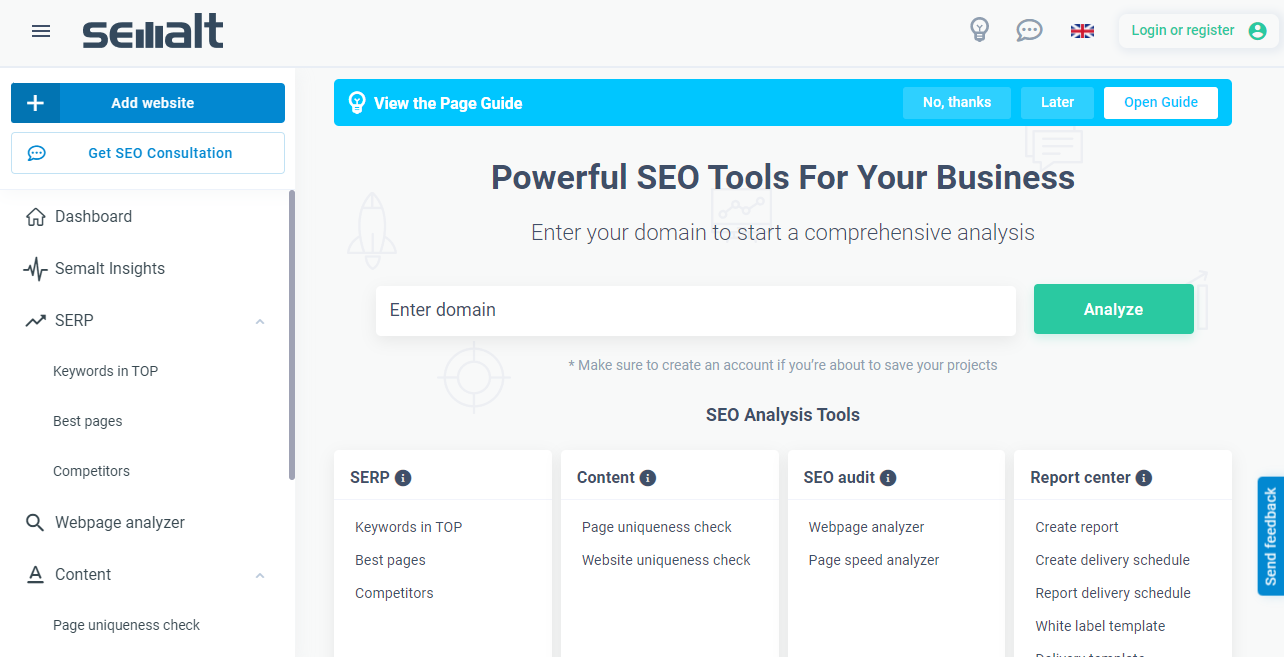10 SEO Secrets To Improve Your Website Ranking - Semalt Expert

Search engines are the main drivers of traffic on the Internet, especially Google. People have become accustomed to using Google as their browser, typing in what they want and hoping to find it without a hitch. This is a valuable opportunity for those who work with websites on the Internet, because having a good relationship with Google's search algorithm, they will be able to enjoy a good flow of visits.
However, it is not enough for a website to simply exist to gain positions in Google's rankings. You need to adopt good SEO practices first.
Here are 10 tips to improve your website's ranking on Google through SEO. In addition, Semalt supports all businesses in the field of SEO with its best SEO tool: the SEO Personal Dashboard.
Fixing Meta Tags

When Google searches for content on the web, it does its best to extract the correct information from each page and organize it in its search results. In this regard, you need to do some good work on your site to provide accurate and strategic information to make Google's job easier.
In fact, all you have to do is fill in the meta tags correctly. These are special entries in the HTML code of your website pages, where you shall add: title, description and keywords of your content.
Furthermore, among the good SEO practices, it is essential to mention how the precise and assertive use of correct meta tags helps to rank the page well in search engines.
Indeed, this summary that appears on the search engine page is crucial for the internet user to access the page. See how to configure it:
Tell the truth
Be persuasive, provocative and inviting, but never lie. Offer, with great quality and sincerity, a part of the content that the visitor will find when accessing the page and invite him / her to know the whole subject via the link.
Do not make meta tags longer than 153 characters
Meta tags should be direct, objective, clear and not too extensive. Although search engines vary, it is generally recommended that the meta tag does not exceed 153 characters, because if you exceed this number, some of your content will be excluded when Google indexes it.
Quality content

Despite all the existing optimizations, it is essential to write quality content on your site to attract Internet users to read and share them.
Indeed, Google seeks to offer better quality content to its users. To do so, before increasing the ranking of your site in the Google search engine, you must have high-quality content on it.
In addition, content marketing helps in page and text optimization. So, you need to take good care of your content. I have two tips for you to follow to have quality content:
Make a good keyword density
The keywords are responsible for telling the search engines what each text is about. It is thanks to this analysis that search engines like Google and Yahoo rank pages and present them to the Internet user.
Indeed, the density of keywords must be maintained around 2% to 5% of the total words for search engines to understand and rank it.
Leave the keywords in bold or italics
Another method used by Google to rank content is to use bold and italics. Indeed, the keyword must appear, at least once, in bold, to attract the attention of the searcher.
However, it should be remembered that the excessive use of these resources can have an impact totally opposite to what is desired. So don't overuse, do it right.
Appropriate styles and tags
For Google to successfully analyze your site and give it the right position among the search results, it must comply with certain standards.
Indeed, as far as the best SEO techniques are concerned, one practice that should always be implemented is the use of H1, H2, H3, etc., titles in the text. Therefore, the title tags are extremely important in the composition of a page and should be applied in a logical order suggested by Word itself. Use these two tips to succeed:
Use the keyword in the H1 tag
The keyword should be repeated throughout your content, right? But you shouldn't place them just anywhere in your text. Instead, you should insert them strategically and technically in your content. For example, in the h1 title as well as the h2 titles.
Therefore, the keyword must be in the h1 title, as it will be more visible on search engines.
Do not repeat tags on different pages
Have you created a really interesting title for your content and put your keyword in it? Excellent! Now it's time to invest in some new creativity! Never repeat that same tag on different pages; it can confuse the search engine, in addition to decreasing the Google trustworthiness of your site.
Good keywords

Writing for the web and getting good results is not a process based on instinct. Instead, there is research and planning behind each programme, with the aim of maximizing the audience potential of your content. Therefore, keywords are an important part of this strategy.
In fact, do a good study to find out what combinations of terms are the most sought after within the theme of your website and take advantage of this to develop related content. Ask yourself these kinds of questions: what is the best keyword for your page? How can you fully reach your audience?
In addition, with the help of relevant tools such as the DSD, you will make the right keyword choices.
Provide a map

As pointed out, Google does what it can to understand your website's architecture when indexing and placing your pages among the results. One of the main ways to facilitate this is to provide a sitemap in XML. This is a format that Google can read and thus understand the entire layout of your website's pages.
Of all the above, having an up-to-date sitemap ensures that all sections will be indexed correctly. In addition, the SEO Personal Dashboard ensures that all pages and content are indexed by search engines' spiders, thus guaranteeing that no part of the site is left out when Google reacts.
Generate attractive links
Have you ever visited a site where the URL generates a lot of codes and terms that are difficult to understand? Something like:
Instead, set up your management system to use user-friendly URLs that are easily read and remembered by those who see them. This will make the site more accessible and improve its position in Google rankings.
Optimize loading time

Google always strives to provide the best results to its users, including making sure they are not frustrated by a slow site. This being the case, you should analyze your page's performance and consider investing in ways to optimize its speed because a slow website is penalized by Google and ends up suffering to gain an audience.
From then on, using a better SEO tool such as the DSD will make your site more accessible.
Update your website frequently
Google's algorithm is always on the lookout for new versions and pages in the sites it has already catalogued. If your site rarely has updates, it will eventually fall in Google's rankings to make room for more up-to-date pages.
To avoid this, set aside a publishing area on your website and try to include new content.
Indeed, stagnation in time will not help a website to grow. On the other hand, constantly updating and upgrading it will do the trick in the best case.
If you regularly update your site, it will help you attract visitors because the Internet user likes to visit sites that offer new content and it gives credibility to your business.
Earn links

Google discovers websites through links from other pages. That's how it created the largest database on the Internet and established itself as the world's leading search engine. So cultivate good relationships with web content professionals and get into the habit of linking to them.
Indeed, guest blog posts work very well to create links to your site on external pages. Therefore, for good SEO, you need to link to other pages.
By doing so, you give your page immense value. Links are arrows that point to your page from other sites and media. The more links pointing to your content, the more value Google places on your site. To that end, I offer two tips for earning links:
Guest posts
To get those links, one of the first tricks to practice is to do guest posts, which is writing content and articles for other sites and pages to link to their own content.
It is advantageous to do this to generate traffic to your virtual environment. This type of action is also known to be beneficial for expanding your network of contacts.
Offer free content
Another way to get links is to invest in offering free content and articles such as e-books, spreadsheets and webinars.
These documents can be of interest to different audiences, shared by other pages that will link back to your site, thus improving traffic and acknowledging that you and your virtual environment are known for your skills.
Use images correctly
Google does not only use text to index web content, it also uses images. Indeed, images bring a lot of relevant information and are a factor that helps a lot in the ranking of search results.
But, above all, the images on your website must have the appropriate tags and alternative text. Thus, in addition to the classic searches, your site can also appear on Google Images.
Conclusion
All in all, the SEO techniques listed above are some of the best. So, if you have a site and you are facing SEO difficulties, these 10 techniques will help you put all those afflictions behind you and reach the first page of search engines.
Plus, Semalt has all the services you really need to improve your site's SEO with its Personal Dashboard SEO tool.
